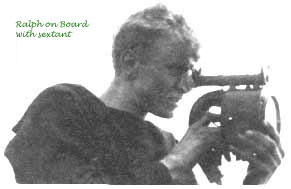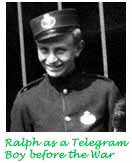

|
|||||
| Ralph Stobart Robson, signalman, life in the British Royal Navy World War Two, sinking of Prince of Wales and the Repulse, Singapore | |||||
|
|||||
|
|||||
|
There we were greeted with disbelief. After the first disdainful comments I was forced to reveal my main argument. It was in the Admiralty instruction book that I had read in some idle moments. There it categorically stated that if a rating did not desire advancement he was to be allowed to remain as he was. I pointed this out to him, but he seemed to ignore it. "You're going to be a signalman whether you want to or not". We were both dismissed. The following day we fell in and he announced the names of those who had passed. Mine and Tubby's were on the list. Later he made everyone trained operators in the same way. The Yeoman in charge of the tests must have been one of his "chummies". The next exercise we went on was the first and last time in India that we saw landing craft. It was to take place just a few miles below Bombay. We were not to take part in the landing but were to be landed on the spot the day before. We went there in an old Indian merchant vessel called the Jalapadma. She had one landing craft and some lifeboats. A second landing craft appeared during the night, apparently towed there by tug. The lifeboats were towed astern and the landing craft hoisted aboard. The troops due for landing were on board and looked most apprehensive. They were little fellows, not much more than five and three quarters high. Ourselves, an army captain and a sergeant were attempting to launch a bren carrier from the davits. She had been equipped with what looked like flotation bags and was being slowly lowered into the water with the two men aboard. The sailors were fascinated. There was a fair swell running, a precursor of a larger storm impending. The carrier was lowered until it appeared to be floating. The officer raised his hand as a signal to stop and lowered it as he action signal. There was a releasing clip, as on a lifeboat, and at the signal the sergeant released the clip. The Bren carrier dropped into the sea and kept on dropping. Luckily the two were wearing life jackets and were swept rapidly astern towards Bombay harbour. I suppose they were picked up. Then, not without some apprehension, we got ourselves by landing craft onto the shore. Fortunately for us we were landed well down the beach. After we had landed our gear (and got well soaked) we established a camp of sorts. Most of us stayed near the camp, but Jeff and I wandered up the beach in the direction of Bombay which we could see as it lay round a point. On our way along the beach we discovered that a river ran into the sea and flowed down the strand. There was a sandbar off the beach but further off the shore was an exposed sandbar with what appeared to be a shallow lagoon behind it. "I hope no one tries to land off that," Jeff said. We turned back and wandered to the campsite. As the day eventually waned and darkness took over we lay and chatted and smoked. Meaby took up his scorpion patrol and eventually we were all asleep and hoping that no residue of the monsoon would arrive. Soon after daylight we realised that the landing was about to be attempted. The wind had increased and a fair sea was running. We were not experienced enough to realise when it was too dangerous, but we were soon to find out. It was soon obvious that the pongoes were having great trouble in embarking the landing craft which were moored alongside the Jalapadma, but eventually some of them were released. They started towards the shore through what seemed to be quite large waves. They approached the shore and when it seemed they were near enough the doors at the bows were lowered. There seemed to be some hesitancy and angry voices could be heard. At last two of the men appeared to have been pushed off and were promptly swept away. Soon there was nothing to be seen of them. We were appalled. The craft approached a little closer and the same tactic took place. By now, and without being told, myself and some of the other lads had stripped off our clothes and ran bollock-naked down to the sea. We managed to rescue five men before the craft withdrew. The language that was called at the craft was nobody's business. The rescued soldiers were terrified and we realised that they had seen the sea for the first time when they had embarked at Bombay. We stripped and dressed them in blankets. Imagine the sight. Naked matelots meet naked pongoes. Later in the day an army truck was sent down to take them away. The landing was called off. About twelve men had been lost. We returned to Bandra. That afternoon we were turned out as Trixie wanted to speak to us. He said he was sorry the exercise had ended so abruptly. He then said that we were lucky it was only a few wogs that were lost. An astonished silence followed. Then a sharp voice pierced the air. "You callous bastard! You're not as good as the big toe of one of those men". Nothing further was said and the parade was abruptly dismissed. The speaker was Tubby. Afterwards he said he had no idea what got into him. Fools and Horses. Tubby's standing suddenly rose in the group. |
|||||
|
|||||
